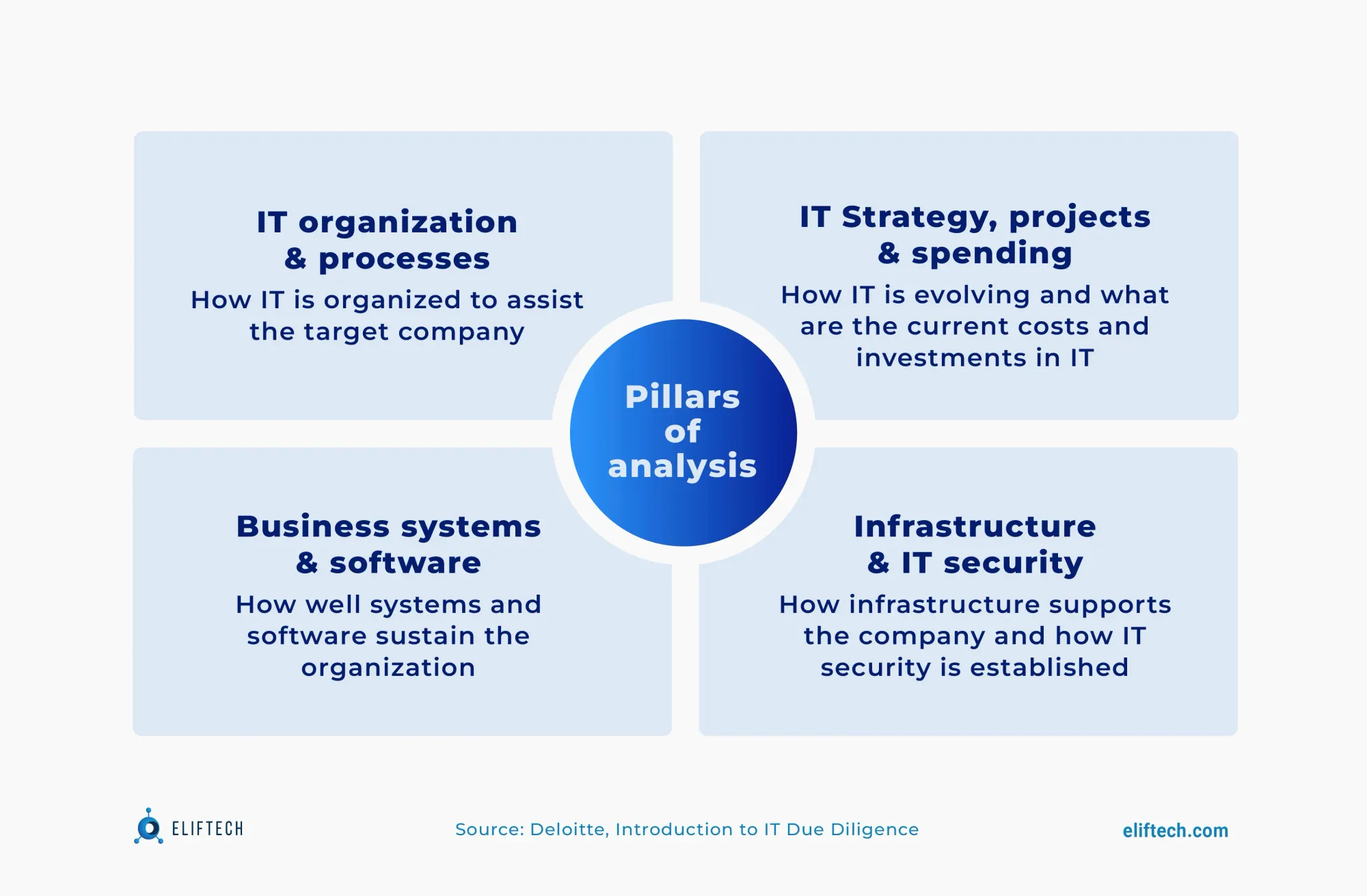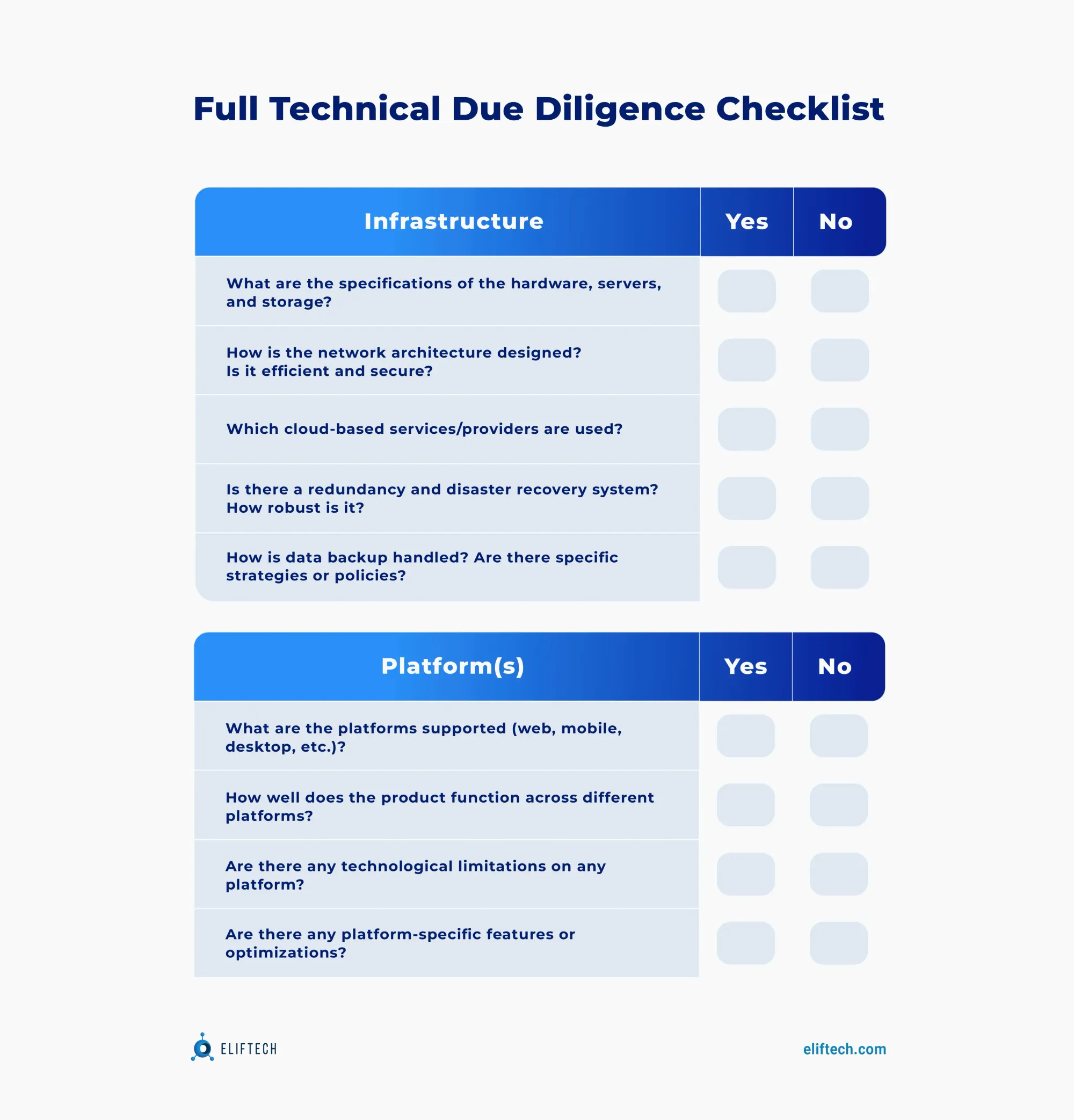Outsourcing
Technical Due Diligence: The Ultimate Guide for Startups and Investors

In the competitive world of tech acquisitions and investments, technical due diligence is a crucial step for success:
- For startup founders: it’s the key to proving your technology can scale and withstand scrutiny
- For investors: it’s how you uncover risks and ensure your money is going into a solid, reliable venture
Yet, many startups miss this step—and it shows. Recent data indicates that approximately 90% of startups eventually fail, with about 10% not surviving their first year. The reason? They overlook critical technical weaknesses that could have been addressed early on.
Whether you’re a founder preparing for evaluation or an investor assessing a potential deal, we’ll walk you through the essentials of technical due diligence. You’ll discover what it means, how the process works, and get a free checklist to guide you.
What Is Technical Due Diligence and Why It Matters for Startups and Investors?
Technical due diligence is a process used to evaluate a company’s technology.
This includes looking at its software, systems, IT infrastructure, and how they work together. The goal is to find any problems, check if the technology can grow with the company, and ensure it aligns with business goals.
For example, during a company sale or investment, technical due diligence helps buyers or investors understand the strengths and weaknesses of the technology. It can uncover issues like outdated systems, security risks, or whether the technology can handle more users. In fact, according to a report by the M&A Community, over 60% of executives cite poor due diligence as the main reason for deal failure.
Simply put, technical due diligence acts as a “health check” for a company’s technology, ensuring it’s reliable, secure, and ready for the future.

Don’t risk overlooking critical issues in your technology evaluations. Our checklist gives you a structured approach to assess any company’s tech systems with confidence.
This checklist will help you:
✔️ Check infrastructure, software, and security
✔️ Spot risks and scalability issues
✔️ Prepare for investments, mergers, or partnerships
DOWNLOAD NOW
Key Components of Technical Due Diligence
The primary reason to conduct tech due diligence is to uncover and evaluate potential risks and figure out how they might impact the business venture. It provides valuable insights and churns out an unbiased evaluation of a company's technical operations.
The evaluation usually includes:
Code Reviews
It's an analysis of the quality, performance, and maintainability of the code written for the platform or application. If a platform's code base is disorganized or shows repetition—often referred to as 'code smells'—this could signal that the product was rushed or not given due diligence, both of which could significantly slow down future development. The code review is sometimes conducted as a part of independent software consulting services. Keep in mind that hiring an independent consulting firm is always an option to ensure your business safety.
Security Checks
These include evaluations of the system's strengths and weaknesses in preventing, detecting, and handling security threats. For example, suppose a startup has built an app handling sensitive user data, and upon a security review, it may be discovered that the app is susceptible to SQL injection, a common hacking technique. It's essential to identify such vulnerabilities to prevent future security breaches.
Scalability Assessment
Reviewing the system's capacity to handle growth or increased demands, like, for example, a sudden spike in user traffic that could lead to server crashes and customer dissatisfaction.
Reviews of development processes
Examining the methodologies and practices used in custom software development, from planning to deployment. Suppose a tech platform is frequently plagued with bugs upon each new release. This could indicate that there's no efficient testing or quality assurance process in place, which affects the overall delivery and user experience of the product. The reason may also lay in different types of technical debt, meaning that the vendor took shortcuts and implemented quick fixes in development.
When Do You Need Technical Due Diligence?
Technical due diligence becomes necessary in several scenarios. Some of these include:
- Before acquiring or investing in a tech venture
For example, to reveal how the startup's platform deals with large volumes of users or if there are any potential security issues—critical information that can influence your decision to invest.
- If your business is considering a partnership with another tech firm
Technical due diligence can help you understand your potential partner's technical capabilities. For example, you might spot some technological misalignment, such as the use of outmoded coding languages, which could impact collaborative development projects.
- When preparing your own startup for a funding round or for a potential merger or acquisition
If your startup is gearing up for a funding round, due diligence can identify and resolve any potential technological bottlenecks. This will ensure your venture is seen in the best light by prospective investors. You may also need to consider using CTO services if your business is expected to undergo a rigorous funding audit.
Who Conducts Tech Due Diligence?
Technical due diligence is typically carried out by:
- Internal Technical Teams: Experienced engineers or CTOs within the company may lead the evaluation.
- Third-Party Firms: External specialists with expertise in coding, infrastructure, architecture, and security are often preferred for an impartial assessment.
As a third-party vendor, we bring expertise across technical domains. Our team provides a detailed analysis of your technology and actionable recommendations to address weaknesses, helping you build a stronger, more scalable foundation for growth.
Get tailored solutions to solve your toughest technical challenges and drive growth.
✔️ Improve product strategy and design.
✔️ Optimize architecture and scalability.
✔️ Enhance security and adopt new technologies.
TALK TO OUR EXPERTS
The Step-by-Step Process of Technical Due Diligence
Technical due diligence takes time and attention to detail. As a software development team, we at ElifTech have served as independent evaluators, auditing codebases to uncover strengths and weaknesses before a full due diligence process. Our goal in every project is clear: ensure technical robustness and readiness for future growth.
Here's what the breakdown of this process generally looks like:
Pre-assessment
Before diving into detailed evaluations or audits, the initial stage begins with understanding the existing technical landscape. This involves a thorough knowledge gathering process about the company's product(s), technology stack, market position, and competition. It sets the context for later stages, providing a comprehensive overview that will be instrumental in guiding the due diligence process. This stage should equip the evaluating team with a fundamental understanding of what the startup's technology is, what it does, and how it does it.
Code review and architecture evaluation
We proceed to conduct thorough code reviews and architecture evaluations following the pre-assessment. This stage comprises careful inspections of the code quality, codebase organization, and the technology stack. Architectural decisions, scalability, maintainability, reliability, and security practices are also scrutinized. This stage provides insights into the product's technological health and scalability.
On-site technical inspection
An in-depth exploration of the startup's tech ecosystem is essential after preliminary checks. This often involves on-site visits, though remote evaluations have become increasingly prevalent in the digital age. Our technical specialists scrutinize various elements such as system architecture, codebase, security measures, and deployment and testing routines. The objective here is to ensure the startup's technology aligns with industry best practices and can withstand the rapidly changing tech landscape.
Analyzing technical documentation
A poorly documented tech venture can face significant challenges during mergers and acquisitions, making technical documentation a critical focus in due diligence. This process involves examining system architecture designs, test plans, product specifications, user manuals, and intellectual property rights to ensure clarity, accuracy, and readiness for evaluation. Comprehensive documentation not only builds confidence but also highlights the venture's operational and technological strengths.
Evaluating development practices and processes
We assess the startup's development practices and processes, including development methodologies (Agile vs Waterfall), project management tools, version control systems, and code review routines. Critical performance indicators are also monitored. The objective is to ensure the startup's development processes are consistent, reliable, and agile to adapt to future needs and challenges.
Tech stack market alignment
The final step ensures that the technology stack aligns with industry trends and standards. The product's adaptability to technological changes is reviewed, and we confirm whether the technical choices the startup made are future-proof and capable of handling potential growth and expansion.
A Complete Technical Due Diligence Checklist
Companies preparing for due diligence may often wonder about the areas in focus. To offer a glimpse into methodology and areas of focus, we have prepared a detailed technical due diligence checklist.

It can be broadly divided into the following areas of interest: infrastructure, platforms, software architecture, coding standards & quality, security measures, dependencies, scalability, operational processes, and team capabilities & structure.
Every one of these components sheds light on different facets of a company's technological standpoint.
Infrastructure
Infrastructure is akin to the company's digital groundwork. It forms the backbone that holds the rest of the tech operations. Analyzing it gives insight into the robustness, reliability, and scalability of the deployed technology. Details like network architecture, cloud service providers, data backup strategies, and disaster recovery systems, while mentioned in the checklist, reveal the overall resiliency of the digital structure.
Pro Tip: Look for a network architect with experience in cloud services and disaster recovery systems to help establish and demonstrate the strength and resilience of your digital infrastructure.
Platforms
The platforms represent where the product is in use – web, mobile, and desktop applications. Turning an analytical eye toward the potential limitations, technological adaptability, and platform-specific features can indicate the efficiency of the product or service. It also offers insight into the feasibility of future expansion across different technologies and platforms.
Pro Tip: Engage a platform-specific developer or consultant to ensure efficiency in platform-specific features and enable future expansion across different technologies and platforms.
Software architecture
Examining the software architecture can offer a wide-lens view of the system's design and flexibility, as well as its maintainability – factors that play a pivotal role in accommodating future changes or integrations, thus adding value to businesses in the long run.
Pro Tip: Engage a software architect who can assess and improve the system's design, flexibility, and maintainability to ensure long-term value for the business.
Coding standards & quality
Quality plays a paramount role in code development. By looking at code readability, modularity, reusability, and conformity to coding practices, we can gain a sense of the software's overall health and maintainability. High technical debt or poor code quality could imply significant future costs to rectify issues and keep the software running efficiently.
Pro Tip: Consider bringing in a senior developer or code expert to review and enhance the code quality, reducing technical debt, and improving overall software health.
Security measures
In an age of digital threats, understanding and gauging cyber-security measures form a critical part of due diligence. Assessing security protocols helps to expose potential vulnerabilities, thereby preventing future compromises and breaches, securing user trust, and protecting the company's reputation.
Pro Tip: Engage a cybersecurity expert to assess security protocols, identify vulnerabilities, and implement improvements to protect the company's reputation and secure user trust.
Dependencies
Inspecting dependencies, including third-party libraries, services, and APIs uncovers any licensing compliance concerns, giving an insight into the associated risk. Furthermore, it can also provide a view towards the feasibility and long-term impact of integrating the technology within an existing tech stack.
Pro Tip: Consult a software licensing expert to verify compliance related to third-party libraries, services, and APIs, minimizing the associated risks.
Scalability
The scalability of a system is a crucial factor in determining its potential for growth and its resilience in the face of increased demand. Evaluating systems' load management and how efficiently data growth is managed can assist in verifying whether the technology can withstand and flourish under future developments.
Pro Tip: Involve a performance engineer or expert in scaling systems to ensure the technology can withstand increased demand and accommodate future growth.
Operational processes
Operational processes provide insight into the practical, day-to-day running of a business's digital end. By examining the deployment, release processes, error logging, and resolution procedures, we can uncover areas of inefficiency or potential difficulty, influencing future productivity and revenue.
Pro Tip: Hire a DevOps expert to streamline deployment pipelines, automate release processes, and improve error resolution procedures.
Team capabilities & structure
The team's capabilities directly impact the performance and sustainability of the tech stack. A skilled and knowledgeable team bestows the company with a competitive edge, agility, and propensity to meet current and future tech demands.
Pro Tip: Seek the help of a DevOps expert or process consultant to analyze and streamline deployment, release processes, error logging, and resolution procedures.
Leverage our experienced CTO services to strengthen your technology and drive your business forward.
✔️ Develop and implement a clear tech strategy.
✔️ Optimize resources and streamline development.
✔️ Ensure scalability, security, and innovation.
DISCOVER CTO SERVICES
How to Prepare Your Startup for a Technical Due Diligence Audit
Preparing for tech due diligence can feel overwhelming, but focusing on the right areas can make all the difference. Here’s what your company should prioritize:
- Maintain comprehensive technical documentation that clearly showcases your technology aspects and operations.
- Prove that your tech infrastructure is not just functional, but also scalable and adaptable to future growth and shifts.
- Adhere to high coding standards to minimize technical debt and ensure the long-term sustainability of your products.
- Prioritize cybersecurity measures and ensure compliance with established security standards.
- Distribute tech skills and responsibilities across your team to avoid over-reliance on a few individuals.
- Finally, don't neglect non-technical aspects. A holistic understanding of your business is crucial for technical due diligence.
The final and crucial step:
Not all companies possess the expertise required for a rigorous audit. If your current team is short on tech talent or stretched thin, it may prove valuable to enlist an external consulting team. They can provide the necessary in-depth knowledge and expertise to optimize your project and increase your chances of successful tech due diligence.
At the end of the day, the target is not just to survive the due diligence process but to emerge successfully with a strengthened technological platform ready for sustainable and agile growth.
Common Reasons Startups Fail Without Due Diligence
Navigating the realm of technical due diligence (TDD) can indeed be precarious, especially for startups. Despite having promising ideas and the enthusiasm to match, some startups stumble in this critical area. Here are some key reasons why these budding enterprises might falter during the tech due diligence process.
Inadequate technical documentation
As startups hustle to build their products and bring them to market quickly, comprehensive technical documentation often takes a back seat. However, in TDD, the lack of proper documentation is a glaring red flag. It raises questions about the sustainability of the technology, its maintenance procedures, and its ability to scale or be integrated with other systems.
Lack of a robust and scalable infrastructure
Startups, understandably, focus on making their ideas work in the short-term often neglecting to future-proof their technology. But TDD requires a long-term vision, assessing whether the infrastructure can scale as the company grows or adapt to industry shifts. A failure to demonstrate this adaptability and scalability could be fatal.
Poor code quality
In the rush to the market, corners may be cut in the coding process resulting in 'quick and dirty' code. However, poor quality code, lack of consistent coding standards, or extensive technical debt can lead to significant concerns about future maintenance costs and can be a chief reason for failing TDD.
Read more: Types of Technical Debt: How to Prioritize and Reduce It
Insufficient security measures
Cybersecurity is an essential aspect of any tech-based venture. Startups sometimes underestimate this need, putting them in a vulnerable position. Insufficient security measures or lack of compliance with standard security practices can severely hold back startups in the TDD process.
Dependency on key individuals
Startups often lean heavily on a few key individuals for their technological needs. However, if these skills aren't transferable, or expertise isn't spread across the team, it creates a risk that can scare off potential investors. This over-reliance on a few can indeed make or break a startup in technical due diligence.
Undervaluing non-technical aspects
While technology forms the core, non-technical aspects like user experience, market timing, or customer feedback play an undeniable role in a product’s success. Overlooking these in favor of tech aspects can fail to demonstrate a holistic understanding of the business, often leading to TDD failures.
Lack of experienced developers
Startups, especially those on a tight budget, might hire junior developers to develop their product. This decision can lead to issues such as insufficient code quality and poor development practices, which are detected during technical due diligence. As a result, potential investors may question the company's technological capabilities and competence.
In this case, a thorough audit of the startup's software must be conducted as soon as possible, identifying areas of insufficient code quality or poor development practices.
Don’t let technical gaps hold your startup back. Our custom development services help you avoid these common pitfalls and prepare for success in technical due diligence.
✔️ Improve code quality and scalability.
✔️ Build robust, future-proof infrastructure.
✔️ Enhance security and development practices.
EXLPORE OUR SERVICES
FAQ
What is technology due diligence?
Technology due diligence involves assessing a company’s entire technology stack, intellectual property, and compliance to ensure the systems can support operations and future growth while identifying risks.
What is the meaning of technical due diligence?
Technical due diligence is the process of evaluating a company’s technology systems, including software, hardware, and IT practices, to identify risks, assess scalability, and ensure alignment with business goals.
How to perform technical due diligence?
- Scope: Define what will be reviewed (e.g., systems, security).
- Gather Info: Collect documents like system designs and roadmaps.
- Assess: Review code quality, scalability, and team capabilities.
- Test Security: Check for vulnerabilities and compliance.
- Report: Summarize risks, strengths, and recommendations.
What are the three types of diligence?
- Financial: Reviews financial records for stability.
- Legal: Examines contracts and regulatory compliance.
- Technical: Evaluates technology systems for risks and scalability.
